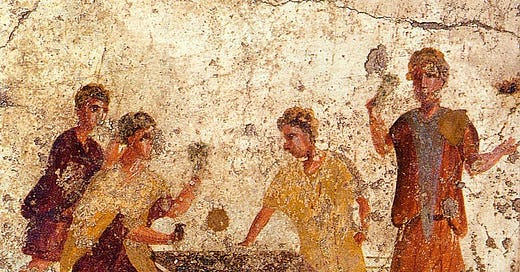Hello and Welcome to a new Dropout Classicist Newsletter! There seems to be a lot more of you than as of last newsletter, and I would like to apologise for my delay in getting this one out! All in all, between illness and university applications, I have found myself with very little time to write. Nonetheless, I hope you enjoy this deep dive into a single phrase - it has been on my mind for a while.
Catchphrases from the ancient world often survive the tests of time, often used by the slightly more pretentious, or politicians wishing to imitate their idols. The phrase ‘Alea iacta est’ is one such utterance we see frequently recurring, or at least in its English translation. Said translation is of course ‘The die is cast’. But this phrase has a much more complicated and interesting history than one notices at first glance, full of misquoting and references.
It is bleak early January in Northern Italy and Gaius Julius Caesar stands before the banks of the Rubicon. Behind him stand his loyal generals and sole, waiting for the pivotal moment. He is about to change history, and the chill in the air is not just from the winter breeze. Every legionary is stood in suspense, watching Caesar on his horse. He dismounts, setting a foot in the river, and announces to his troops ‘Alea iacta est’. This is the scene painted by Suetonius, and embellished a little by me. But no doubt this is how the moment is often viewed. Caesar’s crossing the Rubicon is often treated as a turning point in the world, and to some extent it was. But would it really have been all that dramatic?
Political analysis is always easier to do in hindsight, and biographers in the ancient world no doubt had a habit of looking for ‘pivotal moments’. The go-to example that is drilled into every Classics students’ head is the battle of Actium for the emperor Augustus. This was often lorded by Roman writers as the moment Augustus beat Mark Anthony and Cleopatra for good, a moment of glory and triumph, but in reality it was barely even a skirmish. Augustus was not even present at the battle of Actium, and both Anthony and Cleopatra retreated before much fighting was actually done. Nonetheless, this has not stopped it being developed into the story of the Romans by writers like Virgil. Is Caesar’s crossing of the Rubicon a similar moment? It is very likely. For a start, the Rubicon itself was not an overly significant landmark. It is barely more than a stream nowadays, and for a very long time we did not even know its exact location. Only in 1933 was a river in the area attributed to be the mythical crossing point. Nor do we know the date of the crossing, and the Romans were incredibly good at recording important dates. However, it is easy to see why such a moment was embellished. The Romans needed a moment that, in retrospect, represented this monuments shift in power and the rise to power of Caesar. Roughly where the Rubicon was crossed is where Caesar entered Italy with his army, violating Roman law. This violation of law was his first true step to becoming dictator, and so it needs an equally dramatic scene attached to it.
The uncertainty of this moment in Roman history is multiplied further by the discrepancies seen in other biographers. Plutarch and Arrian both wrote on the scene, and both claim that Caesar exclaimed in Greek. Suetonius also states this, though he gives the quote in Latin. Both state an almost identical phrase of ‘Ἀνερρίφθω κύβος’, which translates as ‘Let the die be cast’. Language nerds will immediately notice a small difference here, besides the fact he is quoted in an entirely different language. According to both Plutarch and Arrian, Caesar uses a 3rd person imperative verb, whereas Suetonius’ version has Caesar use a 3rd person indicative. This has led to one of my favourite things: scholarly debate over discrepancies in language! I have no doubt that most readers will not care much for this, so I shall keep it brief. To summarise, it seems widely agreed upon that Suetonius’ version is incorrect, and that it should read ‘Alea iacta esto’, which would then make it much closer to the Greek. The missing ‘o’ could be down to a variety of reasons, the most likely either being manuscript corruption, or a genuine mistake on Suetonius’ behalf. Either way, if you ever hear someone mimicking Caesar, you have my blessing to correct them.
But what did Julius mean by this? Well, that in itself is more interesting than the politics, or at least it is to me. Of course, one could analyse it from his perspective of uncertainty. After all, he is gambling his life and power on this one move. He will either will all or lose all. However, there is a much more interesting side than this: Caesar is quoting the Greek playwright Menander. Menander is widely regarded as the sole pillar of Athenian new comedy (the style of comedy that Shakespeare writes, with all the marriages and mistaken identities and such). Unfortunately, we do not have enough plays by Menander to know for certain. Most of his plays did not last, beyond a few fragments and a couple almost complete ones. Nonetheless, Suetonius, despite his quoting error, does preserve a testament from Caesar for his love of Menander. He loved his work so much that he wrote a poem about it. Thus, bearing this in mind, can we almost see Caesar’s quote of Menander at such a moment as a joke? And perhaps a joke that was not even supposed to go down in history as such a monuments phrase, but perhaps only ever intended to be whispered to close friends to levitate the nerves?
Finally, I would like to dissect one final interesting point. The word ‘alea’ does not strictly translate to dice, whereas the word ‘κύβος' definitely does. In fact, according to Lewis and Short, alea commonly refers to a specific type of dice game. According to their definition, alea is played with two types of dice: three tesseare and four tali. Tesserae are similar to our modern six-sided dice, even often with the same pips on the faces, and the same word is also used to describe mosaic tiles. Tali however are a form of four-sided dice, but are not pyramid shaped. This is odd, as pyramid shaped dice where in usage in the Mediterranean, as we know thanks to the Royal Game of Ur. However, these tali were cuboid but with two sides smooth, so only four could be landed on, thus resembling and likely evolving from knucklebones, which were also often thrown as a form of gambling game. A talus (singular of tali) is the latin for a knucklebone, and the root of the English talon.
The rest of the rules of the game seem to be based on the score of the dice, but with certain roles having names similar to poker hands. Ironically to Julius, his adopted son Augustus banned the game for all of the year besides Saturnalia, a festival later replaced by Christmas wherein often social norms were reversed and gifts exchanged. This ban didn’t last too long, as the Emperor Claudius later wrote an essay on alea and dice games, which unfortunately is lost. The word alea itself was synonymous with gambling, colloquially being a word for any form of risk, a perfect word for a time of political turmoil.
Sources & Further Reading
Suetonius - Life of Julius Caesar, Life of Divus Augustus, Life of Divus Claudius
Plutarch - Life of Pompey
Arrian - The Civil Wars
Lewis and Short - Latin Dictionary (preserved via LOGEION)
Rubicon - Tom Holland
SPQR - Mary Beard
Emperor of Rome - Mary Beard








Indeed - with the Romans, the die of civilization were cast... And they ruined everything.
https://open.substack.com/pub/heyslick/p/the-romans-ruined-everything